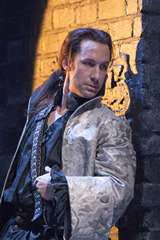| Opera Reviews | 3 May 2024 |
A seductive Don Giovanniby Catriona Graham |
|
| Mozart: Don Giovanni Scottish Opera Edinburgh Festival Theatre November 2013 |
|
|
Sir Thomas Allen, in his time a notable Don, directs an unfussy production, his third Mozart opera for Scottish Opera. It is set in Simon Higlett's dilapidated Venice, accentuated by Mark Jonathan's effectively dark and gloomy lighting. The performance space, bounded front and back by canals and surrounded by tall buildings, opens into courtyards with gated alleyways off, or the spacious square rooms of Giovanni's mansion, perfect for a party. Donna Elvira (Lisa Milne in good voice) is in opulent burgundy and gold brocade. She is openly conflicted, seeking revenge because she is in love with Giovanni and would take him back if only he could be faithful and trusted. We see and hear her emotions fluctuate till, after his death, she realises her loss as she hands the notorious black book to Leporello. Elegant in black mourning clothes, Anita Watson (Donna Anna) well conveys her sorrow at her father's death, as well as her love for Don Ottavio - we can believe that they will marry, once she has had time to grieve. As her fiancé, Ed Lyon is honourable rather than wet, even grows in stature. His arias are sung robustly and he is an active participant in the vengeance against Giovanni, rather than merely trailing in the vengeful women's wake. As a foil for Giovanni, Peter Kalman's Leporello is all he should be, alternately fed-up with and revelling in Giovanni's bad behaviour, He has a lively and expressive face with which to make the most of the famous catalogue song. His complicity in the Commendatore's murder - his is the hand holding the knife - is a morally ambiguous touch of which, cleverly, little is subsequently made. Jenkins-Róbertsson invests Zerlina with more gravity and maturity than the usual flirtatious soubrette, while Barnaby Rea's Masetto is no forelock-tugging yokel - his proto-socialist remarks a reminder of the similarities between this opera and the earlier The Marriage of Figaro. Their relationship has unsettling suggestions of S&M. And what of the Commendatore? Jóhan Smári Sćvarsson is a more impressive statue than he was a man - albeit in his nightclothes. His arrival in Giovanni's mansion is suitably scary. Giovanni is dragged off to hell through the fireplace by demons in grey tatters - the flames echoing his earlier exit at the end of the first act. Is it for murder, libertinism, or asking a statue to supper that he fails to repent? Holding all this together in the pit is the orchestra - with a special mention of John Robinson's mandolin solo - ably conducted by Speranza Scappucci |
|
| Text ©
Catriona Graham Photo © James Glossop |

 It is so much easier to believe in Don Giovanni, if the man singing
the title role is half-ways sexy. It's a plum part for a singer like
Jacques Imbrailo, locks slicked back in a loose ponytail, looking gorgeous
as he stalks across the stage, his long silvery brocade coat flowing
behind him. I bet he seduces half the women in the audience, singing
'Lŕ ci darem la mano' with Zerlina (Ruth Jenkins-Róbertsson). He could
charm birds from trees.
It is so much easier to believe in Don Giovanni, if the man singing
the title role is half-ways sexy. It's a plum part for a singer like
Jacques Imbrailo, locks slicked back in a loose ponytail, looking gorgeous
as he stalks across the stage, his long silvery brocade coat flowing
behind him. I bet he seduces half the women in the audience, singing
'Lŕ ci darem la mano' with Zerlina (Ruth Jenkins-Róbertsson). He could
charm birds from trees. 





